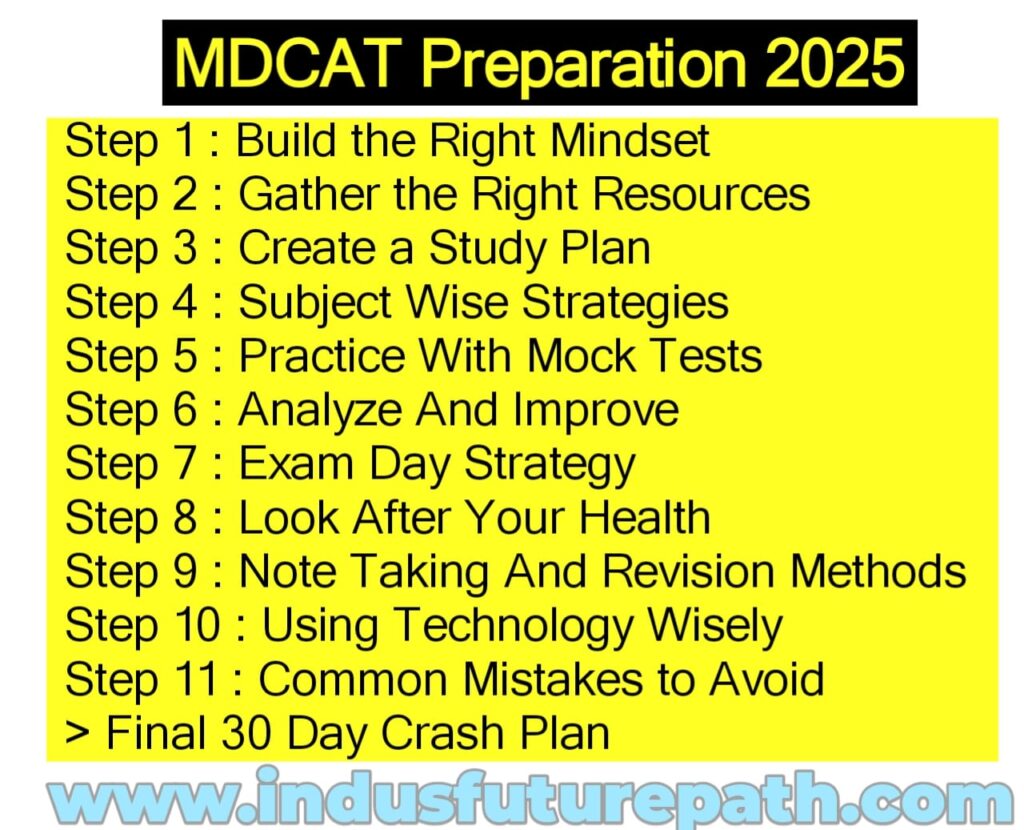
In Pakistan, every year thousands of students complete their FSc (Pre-Medical) or A-Levels with one dream in mind to become a doctor or dentist. The first big step toward that dream is the MDCAT Preparation for the Medical and Dental College Admission Test (MDCAT). It’s a tough exam, no doubt, but it is also the only gateway to top government and private medical colleges in Pakistan
Now here’s the truth: not every student has access to fancy academies in Lahore, Karachi, or Islamabad. Some live in smaller towns where such facilities don’t even exist. Others simply cannot afford the extremely high academy fees. And then there are students who prefer the comfort of home study, where they can design their own schedule.

The good news is that you can absolutely prepare for MDCAT at home and still achieve a high score. Many toppers every year prove that success depends more on your dedication, planning, and strategy than on whether you paid lakhs to an academy. This article is a complete self-study guide for MDCAT preparation. It will cover the exam pattern, planning methods, subject-wise tips, mock tests, and revision strategies. Everything you need to succeed while studying at home
Exam Overview for MDCAT Preparation
Before you open your books, you need to know exactly what the exam looks like.
| Syllabus | Mcqs |
| Biology | 68 |
| Chemistry | 56 |
| Physics | 56 |
| English | 20 |
| Logical Reasoning | 10 |
| Total MCQS | 210 |
| Duration | 3.5 Hours |
Why This Matters in MDCAT Preparation
The weightage shows you where to spend most of your energy. For example:
- Biology alone makes up around 32% of the paper. That means if you’re weak in biology, your overall chances drop quickly.
- English and Logical Reasoning are smaller sections, but together they can give you the 20–30 extra marks that push you above the merit cut-off.
Step 1: Build the Strong Mindset
Studying at home sounds convenient, but it comes with one big challenge self-discipline. At an academy, there are teachers, attendance systems, and peer pressure that keep you moving. At home, you are your own teacher, planner, and motivator.
How to train your mindset:
- Consistency is everything. Even 5–6 hours of focused study daily is better than one random 12 hour session.
- Discipline beats motivation Some days you won’t feel like studying. Build a routine so your body and brain know it’s study time whether you feel like it or not.
- Cut distractions. During study hours, keep your phone away, or use apps like Forest Focused to block social media.
- Trust self-study. Thousands of students every year prove that you don’t need an academy if you study smart.
Example: Think of MDCAT prep like gym training. You don’t get fit in one week. You build stamina slowly, with daily effort. Similarly, daily study compounds into big results.
Step 2: Gather the Right Resources
You can’t study effectively if your resources are scattered. Before starting, collect all the materials you’ll need.
Must-have textbooks
- FSc Biology (Part I & II)
- FSc Chemistry (Part I & II)
- FSc Physics (Part I & II)
- English grammar/vocabulary lists
Helpful practice guides
- KIPS MDCAT practice books
- STEP (Punjab Group) MCQ books
- Dogar’s MDCAT guide
- Caravan self-study MCAT book
Online resources
- PMC official syllabus (download latest version)
- YouTube lectures (Physics Wallah, KIPS MDCAT, etc.)
- Free MCQ apps/websites for daily practice

Step 3: Create a Study Plan
Without a proper routine, self-study can quickly become messy. A timetable keeps you organized and reduces stress.
Example Daily Routine (6–7 hours study)
- Biology: 2 hours
- Chemistry: 1.5 hours
- Physics: 1.5 hours
- English + Reasoning: 1 hour
- Revision/MCQs: 1 hour
Weekly structure
- 5 days: Regular syllabus + practice
- 1 day: Full-length mock test
- 1 day: Review mistakes and weak topics
Step 4: Subject-Wise Strategies
Each subject demands a different approach.
| Biology (68 MCQs) | Chemistry (56 MCQs) | Physics (56 MCQs) | English (20 MCQs) | Logical Reasoning (10 MCQs) |
| Read textbooks line by line. Many MCQs are copy-pasted. | Divide into Physical, Organic, and Inorganic chemistry. | Focus on understanding concepts, not just formulas. | Prepare synonyms, antonyms, and sentence corrections. | Practice puzzles, sequences, and cause-effect reasoning. |
| Make flashcards for processes, cycles, and classifications. | Memorize formulas and reactions with mnemonics. | Practice unit conversions. a common trip in MDCAT. | Build a personal vocabulary list (10 words daily). | Attempt at least 10-15 reasoning questions weekly. |
| Revise diagrams regularly. | Practice numerical problems daily. | Revise solved textbook examples. | Practice comprehension questions. | Progress to sectional tests. |
Step 5: Practice with Mock Tests
Mock tests are your rehearsal before the big day.
- Start with chapter-wise tests.
- Progress to sectional tests (e.g., only Biology or Chemistry).
- Attempt full-length mocks (210 MCQs, 3.5 hours).
Benefits of mocks
- Train your brain for sitting 3.5 hours with focus.
- Expose your weak areas.
- Improve time management.
Step 6: Analyze and Improve
Mock tests are useless if you don’t analyze mistakes.
- After every test, mark wrong answers.
- Write mistakes in a weakness notebook.
- Revise these areas before the next test.
Step 7: Exam-Day Strategy
Your knowledge is only half the battle. The other half is managing the paper smartly.
- Attempt biology first. It’s your strongest scoring area.
- Don’t leave blanks. No negative marking = attempt all.
- Divide time wisely:
| Subject | Time |
| Biology | 80 minutes |
| Chemistry | 60 minutes |
| Physics | 60 minutes |
| English + Reasoning | 30 minutes |
Step 8: Look After Your Health
Self-study means you must also manage your health.
- Sleep 7 to 8 hours because a tired brain cannot focus.
- Exercise or walk 20 minutes daily for keep your mind sharp.
- Eat light, balanced meals for avoid junk food and excess caffeine.
Step 9: Note-Taking and Revision Methods
One of the biggest advantages of home study is that you can use note-taking methods that suit you.
Techniques that work
- Cornell Notes: Divide your page into notes, keywords, and summary.
- Mind Maps: For Biology and Chemistry processes.
- Flashcards: For quick recall of terms and formulas.
- Active Recall: Close the book and try explaining the concept to yourself.
Step 10: Using Technology Wisely
While social media distracts, technology can also help your preparation.
- Apps like Quizlet or Anki for flashcards.
- Forest app to stay off your phone.
- YouTube lectures for topics you struggle with.
- WhatsApp/Telegram groups (join only serious study groups, avoid gossip groups).
Step 11: Common Mistakes to Avoid
- Ignoring the PMC syllabus.
- Memorizing without practice.
- Neglecting English and Reasoning.
- Last-minute cramming instead of regular revision.
- Comparing yourself with academy students.
Final 30-Day Crash Plan
If you’ve already studied once, here’s a revision plan for the last month:
- Days 1–20: Daily full mock test + corrections.
- Days 21–25: Revise all biology chapters.
- Days 26–28: Revise physics & chemistry formulas.

Leave a Reply